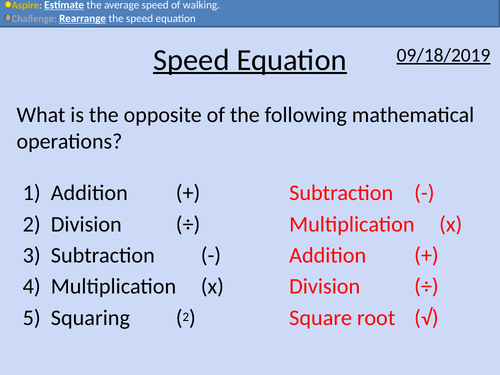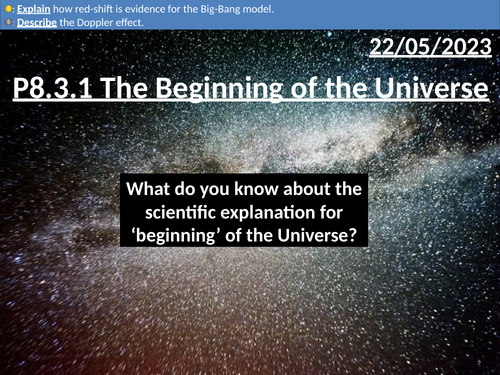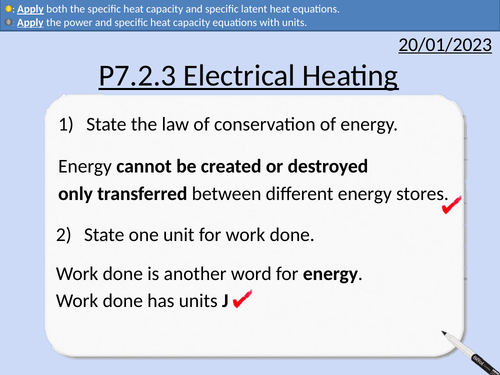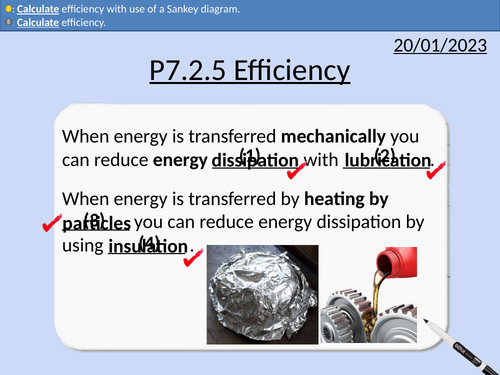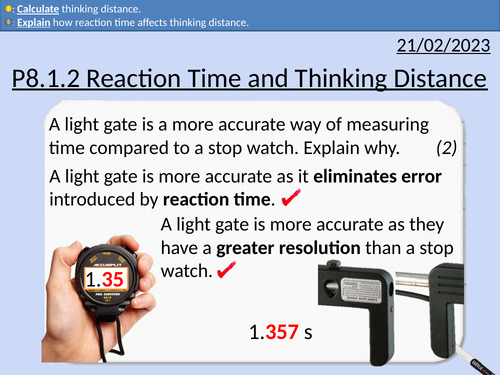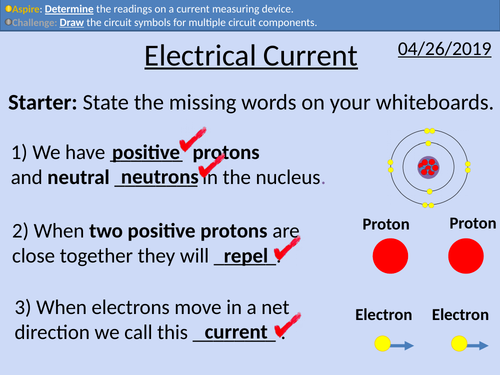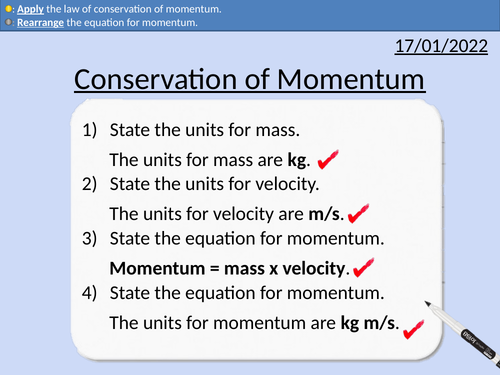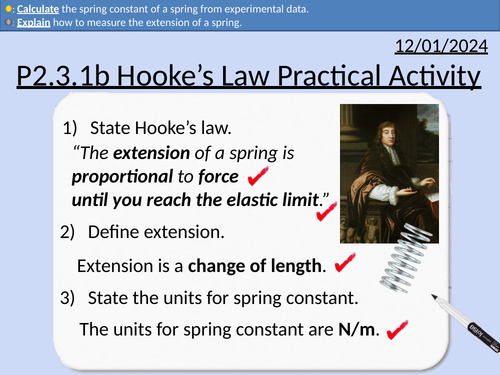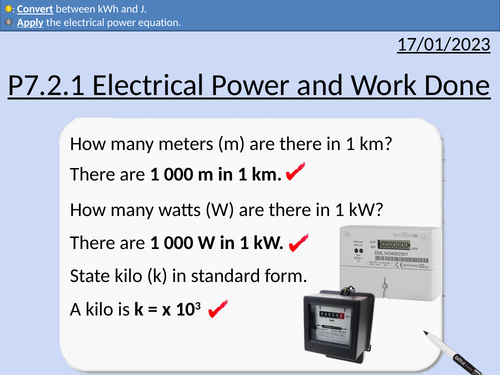497Uploads
167k+Views
71k+Downloads
Physics

GCSE Physics: Forces in Collisions
This presentation covers OCR Gateway Physics 9-1 P8.1.4 Forces in Collisions. All presentations come with student activities and worked solutions.
Large accelerations produce large forces.
Values of g that cause severe injury or death
Road Safety
Newton’s First Law and seat belts
Crumple zones
Force = Mass x Acceleration
Acceleration = Change in velocity /Time taken
Estimating speed, accelerations and forces involved in large accelerations for everyday road transport.

GCSE Physics: Electrical Power and Work Done
This presentation covers OCR Gateway Physics 9-1 P7.2.1 Electrical Power and Work Done. All presentations come with student activities and worked solutions.
Definition of power
Converting between W and kW
Converting between seconds, minutes, and hours
Calculating work done in kWh and J
Converting between kWh and J

GCSE Physics: Speed Equation
This PowerPoint presentation with worked examples and student questions covers:
• The speed equation and units
• Rearranging Equations
• The skill of estimating

GCSE Physics: Introduction to Forces
This PowerPoint presentation with worked examples and student questions covers:
Contact and Non-contact forces
Forces and accelerations
Tug of war example

GCSE Physics: Forces and Large Acclerations
This PowerPoint presentation with worked examples and student questions covers:
Road safety
Force and acceleration equations
How large forces produce dangerous accelerations

GCSE Physics: Balanced Forces
This PowerPoint presentation with worked examples and student questions covers:
Balancing forces with vectors
Accelerations and resultant forces

GCSE Physics: Satellites
This presentation covers OCR Gateway Physics 9-1 P8.3.3 Satellites
This PowerPoint is a whole lessons included with student activities and animated answers.
Natural Satellites
Geostationary Satellites
Low Polar Orbit Satellites
Speed is constant and velocity is changing in stable orbits.
Changing speed and radius
Gravitational force, acceleration, and speed.
Plotting data and describing relationships

GCSE Physics: Fuses and Plugs
This PowerPoint presentation with worked examples and student questions covers:
• The function and sizes of fuses
• Wiring a plug
• Identifying faults with plugs

GCSE Physics: The Big-Bang
This presentation covers OCR Gateway Physics 9-1 P8.3.1 The Big-Bang
This PowerPoint is a whole lessons included with student activities and animated answers.
Key facts about the Big-Bang model
Cosmic Microwave Background (CMB, CMBR)
Doppler Red shift of light from stars in galaxies
Hubble’s evidence of absorption spectra being red shifted

GCSE Physics: Types of Waves
This presentation covers OCR Gateway Physics 9-1 P5.1.1a WaTypes of wave. Includes student activities and full worked answers.
Definition of a wave
Mechanical waves
Electromagnetic waves
Transverse waves
Longitudinal waves

GCSE Physics: Electromagnetic Reflection
This presentation covers OCR Gateway Physics 9-1 P5.3.1a Electromagnetic Reflection. Includes student activities and full worked answers.
Law of reflection
Labeling and measuring angles of incidence and reflection
Practical activity instructions - fully animated.
Reflection, absorption, and refraction is affected by wavelength of electromagnetic wave.

GCSE Physics: Electrical Heating
This presentation covers OCR Gateway Physics 9-1 P7.2.3 Electrical Heating Transfers. All presentations come with student activities and worked solutions.
Walls and Insulation
Thermal energy dissipation
Reducing thermal energy dissipation with lubrication and insulation
Heating substances and state changes
Work done = Power x Time
Change in thermal energy = Mass x Specific Heat Capacity x Change in temperature
Thermal energy for state change = Mass x Specific latent heat

GCSE Physics: Efficiency
This presentation covers OCR Gateway Physics 9-1 P7.2.5 Efficiency.
All presentations come with student activities and worked solutions.
Efficiency Ratings
Improving efficiency with insulation and lubrication
Maximum efficiency
Efficiency equation
Sankey diagrams

GCSE Physics: Reaction Time and Thinking Distance
This presentation covers OCR Gateway Physics 9-1 P8.1.2 Reaction Time and Thinking Distance. All presentations come with student activities and worked solutions.
Reaction time definition
Factors that increase reaction time
Simple reaction time experiment
Thinking distance
Rearranging equations
Speed equation
(Final velocity)2 – (Initial velocity)2 = 2 x Acceleration x Distance
v2 – u2 = 2 a s

GCSE Physics: Electrical Current
This PowerPoint presentation with worked examples and student questions covers:
• Circuit symbols
• Conditions for current to flow
• Measuring current in series circuits
• Measuring current in parallel circuits.

GCSE Physics: Conservation of Momentum
This PowerPoint presentation with worked examples and student questions covers:
Definition for conservation of momentum
Rearranging the momentum equation
Adding vectors (momentum)
Applying conservation of momentum
Elastic and inelastic collision
CERN and discovering particles with conservation of momentum

GCSE Physics: Hooke's Law Practical
This PowerPoint presentation with worked examples and student questions covers:
• Definition of Hooke’s Law
• Converting from centimeters to meters
• Converting from millimeters to meters
• Calculating the spring constant from a gradient of a force-extension graph
• The parallax effect and good experimental practice
• Data analysis (calculating mean and significant figures).

GCSE Physics: Electrical Power and Work Done
This presentation covers OCR Gateway Physics 9-1 P7.2.1 Electrical Power and Work Done. All presentations come with student activities and worked solutions.
Definition of power
Converting between W and kW
Converting between seconds, minutes, and hours
Calculating work done in kWh and J
Converting between kWh and J

GCSE Physics: Electricity and Subatomic Particles
This PowerPoint presentation with worked examples and student questions covers:
• Atoms and the particle model for solids, liquids and gases
• Subatomic particles and the property of charge
• Structure of a metal
• Explanations of the Van de Graff and Lightning.



